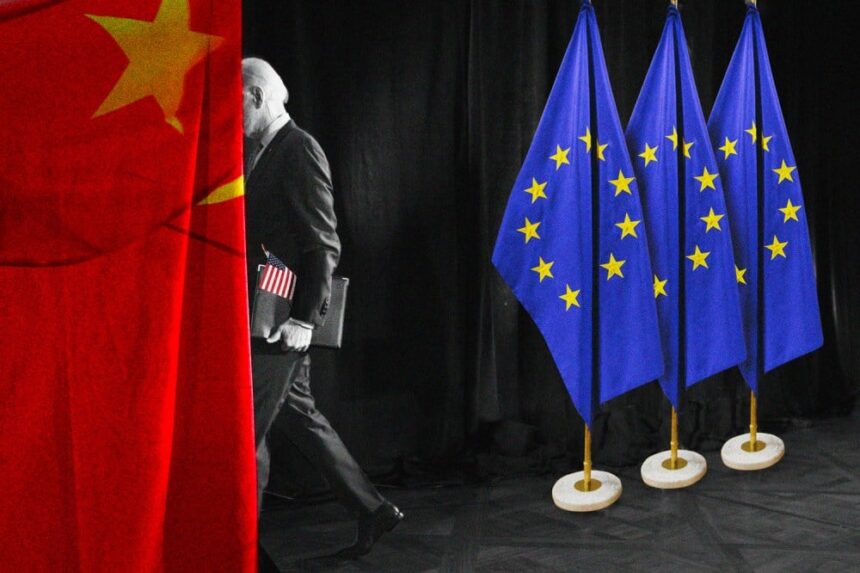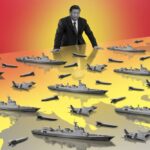The article from Foreign Policy discusses the shifting dynamics of U.S.-European relations in the context of changing U.S. grand strategy, particularly with regard to the rising influence of China and the future of NATO.
Key Points:
1. U.S. Grand Strategy Transition:
- Shifting Focus: The U.S. is transitioning from a unipolar system dominated by American interests to a bipolar system characterized by competition with China. This shift reduces the strategic importance of Europe compared to the past.
- Potential Isolation: There’s a risk of a more isolationist U.S. strategy, which could lead to the dissolution of NATO, a major reconfiguration of trans-Atlantic relations, and increased instability in Europe. This isolationist shift would weaken U.S. influence in Europe and could destabilize the EU.
2. U.S. Strategy Spectrum:
- Mainstream Realism: The most probable future U.S. strategy lies between isolation and primacy. It would involve a realist approach, focusing on balancing power rather than pursuing a global liberal order. This means a stronger U.S. presence in Asia to counter China, with a relatively reduced footprint in Europe.
3. Europe’s Roles in U.S. Strategy:
- Defender of the Liberal Order: Despite a shift to a more realist and China-focused strategy, Europe remains crucial in upholding the liberal international order and maintaining democratic values and multilateral institutions.
- Industrial Powerhouse: Europe is a significant economic player and partner in countering China. A strong economic relationship with Europe is vital for the U.S., especially in managing competition with China.
- Military Enabler: Europe plays a key role in supporting U.S. military operations, including deterring Russia and providing a strategic base for operations in the Middle East, Africa, and Asia. In a China-focused strategy, European military infrastructure will be crucial for power projection and potential economic sanctions against China.
4. Future Considerations:
- Reduced U.S. Presence: Regardless of the 2024 presidential election outcome, Europe should prepare for a reduced U.S. military presence. However, Europe will continue to be important for the U.S. due to its roles in supporting the liberal international order, acting as an economic partner, and enabling military strategy.
In summary, as the U.S. pivots towards a China-centric grand strategy, Europe’s importance evolves but remains significant. The U.S. is likely to prioritize its strategic interests in Asia while maintaining a crucial, albeit reduced, role for Europe in supporting international order, economic strength, and military operations.
For more details, read the full article here below.
Europe’s New Role in U.S. Strategy
The future of U.S.-European relations is emerging as one of the most significant factors that will shape the global system. NATO’s celebration of its 75th anniversary at the bloc’s summit in Washington next week will be overshadowed not only by Russia’s war on Ukraine but by uncertainty over the future of the alliance itself—not least because of the possibility that NATO-bashing former U.S. President Donald Trump could return to power next year.
But regardless of who will hold the reins in Washington, U.S. grand strategy is in transition, adjusting from a U.S.-dominated unipolar system to a bipolar one defined by U.S.-Chinese rivalry. In this new order, Europe suddenly finds itself in the geographic periphery of U.S. interests. European leaders assessing the trans-Atlantic relationship and Europe’s role in it should get ready for a more realist-oriented U.S. grand strategy, where the U.S. strategic footprint is likely to be thick in Asia and thin in Europe.
Due to China’s rise as a rival and peer competitor, a U.S. grand strategy of unipolar primacy is no longer an option. At the other end of the spectrum of possible strategies is isolation. A sudden shift in U.S. strategy to isolation would probably result in the dissolution of NATO, a radical transformation of trans-Atlantic relations, and potential instability in Europe. U.S. abandonment will leave behind a multipolar power structure within Europe—where Germany, France, Britain, and perhaps Italy will act as regional powers in addition to Russia. There is no guarantee that the European Union will continue to function in the same way in a multipolar power structure, which is generally less stable and more prone to conflict than a unipolar or bipolar system. A shift in U.S. strategy to isolation cannot be ruled out—just listen to recent statements from the Trumpist wing of the Republican Party—but it would entail an epochal turnaround in U.S. grand strategy.
An enduring element of U.S. grand strategy since the country’s founding has been to preserve its dominance in the Western Hemisphere and to counter the rise of potential hegemons across its two transoceanic flanking regions in Europe and East Asia. Cold War containment and post-Cold War primacy were two ways of pursuing this goal. Between the two world wars, the United States followed a strategy of isolation, but this was because the balance of power in Europe and Asia at the time allowed it to do so—until the rise of Japan and Germany upset the balance and forced the United States into action. Today, Washington faces a different situation: Regardless of what it does in Europe, turning isolationist in 2025 and withdrawing its forward military posture in East Asia would allow China to be the regional hegemon. No combination of Asian powers can now balance China on its own.
The most likely path forward for the United States, therefore, is not a grand strategy of isolation but one located somewhere on the spectrum between isolation and primacy. To a large degree, it is a grand strategy that resembles mainstream realism—represented not by the Russia apologists and conservative neoisolationists who claim the mantle of realism today but by adherents of a classic balance-of-power approach to foreign policy. It would entail the United States intervening in other geographic regions only when it deems it necessary to keep its flanks from being dominated by a hegemon and with a less forward-leaning approach to advancing the liberal order. In contrast to the Soviet Union, which challenged the United States across both transoceanic flanks, China is a one-flank challenge across the Pacific. It means that the United States is likely to upgrade its posture in Asia and downgrade it in Europe and the Middle East.
The findings from a recent survey by the Chicago Council on Global Affairs confirms this prediction. The survey has received a lot of attention because it indicates that a majority of Trump Republicans would like the United States to stay out of world affairs. But the same survey also reveals that a majority of Trump Republicans think U.S. leaders should pay more attention to competition with China and intervene in a Taiwan conflict, while they are more negative about U.S. alliances in Europe.
In the geopolitical landscape of U.S.-China rivalry, Europe is less significant to U.S. interests than during the Cold War. At the same time, increased polarization between Democrats and Republicans in U.S. politics also suggests that the way Washington implements this new grand strategy may undergo greater swings between administrations than before. But even in a mainstream realist, China-centered, less globally ambitious U.S. strategy, Europe occupies three important roles.
First, Europe is a key defender of the U.S.-led international order. Shared interests in a liberal world order based on democratic government, open economies, and the rules and norms of the United Nations’ multilateral framework have been a pillar in trans-Atlantic ties since the end of World War II. At first glance, it may not be obvious that this should be the focus of a more realist, less globally ambitious U.S. foreign policy. But even as they preached the role of power politics in international relations, classical realists—including British historian E.H. Carr and German American political scientist Hans Morgenthau—acknowledged the importance of morality and constraints on power to achieve foreign-policy goals. During the height of the Cold War, Kenneth N. Waltz, the father of structural realism, argued that U.S. democracy was superior to Soviet authoritarianism in formulating policy. Even under a China-focused strategy, working with Europe to uphold the international order will continue to benefit the United States.
However, the direction of U.S. foreign policy over the past few administrations indicates that Washington’s future approach to the liberal order will likely be less ambitious than before. In a recent joint report, the States United Democracy Center, Protect Democracy, and Law Forward warned about a democracy crisis in the making in the United States. Others argue that the erosion of the U.S. middle class is leading to a more nationalist economic policy. Trumpism has boosted the Republican Party’s existing opposition to multilateralism, further increasing the likelihood that the United States will act unilaterally at the expense of the U.N. framework and other multilateral institutions. A reduced commitment to what has been a jointly upheld order would not only diminish Washington’s ties with Europe but weaken the United States.
An employee holds up a test wafer at an Infineon computer chip factory in Dresden, Germany, on April 26, 2023.Sean Gallup/Getty Images
Second, Europe is an industrial strongpoint in Washington’s rivalry with Beijing. At the end of World War II, the United States was keen to rebuild Europe and Japan because it needed their close cooperation and industrial capacity to contain the Soviet Union. Today, Washington needs Europe in its competition with Beijing. The EU may not be a pole in a bipolar international system, but it is still an economic powerhouse. Its collective GDP in 2023 was slightly larger than China’s. The U.S. economy will be weaker if it cuts trade and other economic ties with Europe, and U.S. de-risking from China will be less effective without European support.
Third, Europe is an enabler of U.S. power projection. It does so in three main ways. To begin with, Europe enables the United States to deter Russia. Even though Russia’s military threat is of secondary importance to the United States compared with the China challenge, Russia’s nuclear arsenal, its dominant position in the Arctic close to the U.S. homeland, and Moscow’s ability to influence developments in the Middle East and elsewhere all indicate that U.S. interests are best served by maintaining a close coordination with Europe. That would include keeping some form of military presence in Russia’s vicinity on the European continent, in addition to Europe taking on a larger responsibility for deterring Russia and stabilizing its own neighborhood. During his meeting with U.S. President Joe Biden in Washington in June, outgoing NATO Secretary-General Jens Stoltenberg announced that NATO allies are increasing their defense spending by 18 percent this year—the biggest increase in decades.
Furthermore, Europe is an important staging area for U.S. military deployments in the Middle East, Africa, Central and South Asia, as well as the Indian Ocean region, either from European airfields or by sea through the Suez Canal. In a China-centered strategy, U.S. attention to Africa and the Middle East is expected to wane, but it would still be in Washington’s interest to use Europe’s substantial military infrastructure as a launching pad to project power into the Indo-Pacific theater, especially if China expands its military presence into the Indian Ocean region.
An F/A Hornet fighter jet flies over Ramstein Air Base in Germany on June 6, during exercises between NATO combat aircraft. Thomas Lohnes/Getty Images
Finally, Europe has a military role to play if the United States finds itself embroiled with China in a military conflict in East Asia. That role should not be to commit rather limited European naval assets to East Asian waters because these assets are needed at home to deter Russia and would have little military effect in the Pacific. Short of a Pacific war-fighting role, European navies could play a significant part in a naval blockade of China by helping to interdict China’s seaborne trade through the Indian Ocean. In any protracted conflict with China, the United States is likely to impose economic sanctions and enforce a naval blockade to hurt Chinese imports of natural resources. For such a blockade to succeed, the United States would need the full support of its allies.
No matter who wins the November U.S. presidential election, European countries need to brace themselves for a reduced U.S. military posture in their region. On the far end of U.S. grand strategic options is isolation and the abandonment of Europe, which would fundamentally redefine trans-Atlantic relations and Europe’s approach to international affairs.
A China-centered U.S. grand strategy, on the other hand, would mean a U.S. footprint that is thick in Asia and thin in Europe. This would also challenge trans-Atlantic relations, but a continued U.S. relationship with Europe would have practical benefits for Washington’s rivalry with Beijing. The change would be less radical, and Europe would serve important roles: as a defender of the liberal international order, as an industrial strongpoint, and as an enabler of U.S. military strategy. Keeping NATO in place is arguably the best guarantee that Europe will fulfill these three roles in a China-centric U.S. grand strategy.
By Jo Inge Bekkevold
Source: Foreign Policy








